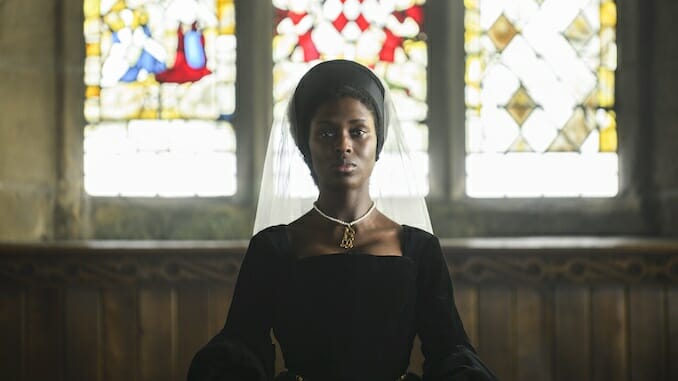Anne Boleyn on AMC+ Freshly Recontextualizes a Tragic Historical Figure
Photo Courtesy of AMC+
Revisiting history is a good thing. The dusty stories we learn in middle and high school in this country are rarely nuanced, updated, or contextualized with the lens of society’s understanding of how patriarchy or systemic bias influenced the original telling of events at the time. And it only gets worse when we’re learning about the stories of the world outside our borders. All of this is why AMC+’s airing of the limited series, Anne Boleyn, arrives when we could all use a fresh look at King Henry VIII’s second wife, mostly remembered today for getting beheaded by him.
Written by Eve Hedderwick Turner and directed by Lynsey Miller, this three-part series (which premiered on the UK’s Channel 5 earlier this year) stars Jodie Turner-Smith (the first Black actress to take the role) as Tudor Queen Anne Boleyn, and the narrative is refreshingly framed from the Queen’s point of view. While she reined as Queen of England for three years, the series is laser-focused on the last five months of her life, in which her position with Henry (Barry Ward) and in his court’s esteem dramatically dissolves, leading to her eventually being charged with treason, adultery, and incest with her brother, George Boleyn.
With the exception of Starz’s The Spanish Princess, if you think back to any film or TV series featuring King Henry VIII, he’s almost certainly portrayed with an outsized, mercurial personality that dominates the focus of the story in which he resides. His six doomed wives are demure victims often used as pawns for his ego, sexual impulsivity, and obsession with siring a male heir. What Anne Boleyn and Turner-Smith do so well in this series is make Anne a far more defined woman with her own ambition, intelligence, and keen strategic savvy.
Though the short series is something of a slow burn, from the very first episode Turner-Smith introduces us to a woman who is at ease with her Queen status. She’s imperious, confident, and a worthy player in knowing how to navigate the governmental and sexual politics of her husband. Pregnant with her fourth child after she miscarried twice (having previously gave birth to a daughter, Elizabeth, which severely disappointed Henry), Anne also knows her value is contingent on the child inside her being a boy, as she sees her husband’s eye wandering towards pious Jane Seymour (Lola Petticrew). And she becomes aware that allied court advisors, like the increasingly smarmy Thomas Cromwell (Jamael Westman), are only too happy to reduce her influence on the king in matters of religion and relationships with countries like France and Spain.
Packing in a lot of context, history, and pivotal events in Anne’s life makes the initial episode a bit bloated with exposition heavy dialogue, and some very on-the-nose foreshadowing moments for future plot turns. Plus, for those who love period pieces to drool over the costuming and production value, Anne Boleyn is relatively restrained in portraying opulence via the sets and costumes. The main Greenwich Palace locale is minimalist, with the most exotic location shooting mostly near ponds and gardens. It’s really Anne’s dresses that grab the eye throughout, featuring beautiful fabrics of teal with jewelry accents giving her a regal glow as she’s framed by the natural light coming from windows and alcoves. Everyone else is functional and era appropriate, so it’s not going to dazzle the peepers like a Downton Abbey or Bridgerton.
-

-

-

-

-

-

-

-

-

-

-

-

-

-

-

-

-

-

-

-

-

-

-

-

-

-

-

-

-

-

-

-

-

-

-

-

-

-

-

-








































